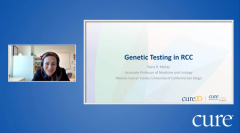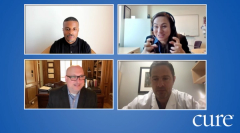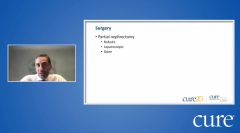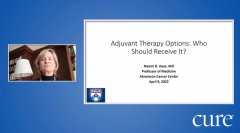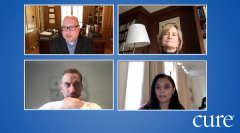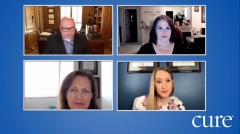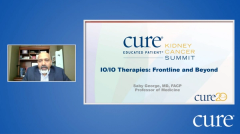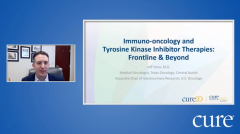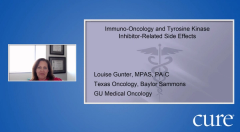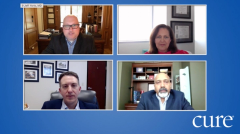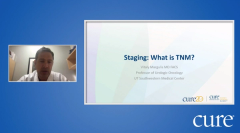
Educated Patient® Kidney Cancer Summit Frontline Therapy Panel: April 9, 2022
Watch Dr. Thomas Hutson, Dr. Jose Karam, Dr, Naomi Haas, and Kiran Kehoe answer questions about frontline therapy during the CURE Educated Patient Kidney Cancer Summit.
Episodes in this series

This panel featured Dr. Thomas Hutson, Dr. Jose Karam, Dr, Naomi Haas, and Kiran Kehoe.
Hutson: We're going to start off with Kiran, and ask her to discuss the resources that KCA has available to patients to understand their frontline therapy options.
Kehoe: Yes, thank you so much. So the KCA, they have a great website with resources that include a diagnostic toolkit, which actually reviews the process of the initial diagnosis, adjuvant treatment resources, such as if patients need financial assistance, there is also a social worker available as well in terms of coping, managing the disease. So really very comprehensive information that's found on the website. The diagnostic tool, I think, is very critical. And it reviews the staging of the disease, the scans that are done, and the rationale for these, and patients find that really helpful, especially with the initial diagnosis and the overwhelming emotions that they have. They do find that a very helpful tool to use.
Hutson: Excellent, thank you. And we certainly appreciate, many of us, at least I know that two speakers here and I have worked with the Kidney Cancer Association since its inception. It's a valuable resource. So I encourage patients and caregivers to get online and check out the resources you have available. This session of our program really highlights the multidisciplinary approach. And I was wondering if one of the panel members can explain why they feel that's important for kidney cancer care?
Haas: Well, I'm happy to take that question. So I think especially for deciding about adjuvant therapy, you know, the urologist is the first person that the patient generally comes into contact with. And I think that having, you know, frank openness from the urologist about whether he or she thinks that it's a bad kidney tumor, and whether there's any other follow-up that needs to be done is important. I think that the medical oncologist, the certain surgical oncologist or the urologist can really tell how the patient tolerated the surgery. And the medical oncologist is very good at parsing out trying to decide who might tolerate one therapy better than another and who might not do well with either kind of adjuvant therapy option. A lot of patients aren't going to see a medical oncologist if they've had surgery, if the surgical oncologist doesn't refer them. And so I think having good communication between the urologists and the medical oncologist is important, but we also offer different perspectives to the patient. I do want to emphasize that, you know, there's a lot to learn in this setting, and I am fine when I meet with patients and have these discussions, I'm going to have patients that want to do everything and really can't sleep unless they do adjuvant therapy, and I'm going to have other patients who really, really don't want to do it and would prefer to be followed closely. And so I think that it is a multidisciplinary setting. And good communication is really important for the patient to be able to decide what the risk is as well.
Karam: Yeah, I mean, I totally agree with Naomi here and it has to be a multidisciplinary discussion in one way or another. So when a patient comes into my clinic, and they have a large tumor, and I know that I have to do a complete or radical nephrectomy, I have a good suspicion that this is going to be a stage 3 tumor. So even before surgery, I tell the patient there might be a chance that you could qualify for adjuvant therapy, but we won't know until we do the surgery and get the full pathology report. So at least a patient, in their mind, they're already mentally prepared that okay, surgery is the first step. There might be other things that are unnecessary for me, or are other options for me. And then when the pathology comes back, have a discussion with the patient about what does it mean, what's the stage and what are the options.
And the options nowadays have to always include adjuvant therapy at least just as an option if the patient fits the criteria such as stage 3 clear cell, and all that, and I do discuss the option of observation alone. And when a clinical trial is available, that option is also discussed with the patient. So in my clinic, I do it like a three-tier discussion of surveillance versus standard of care when there is standard of care available used to be submitted evidence approved or Sutent (sunitinib)and (Keytruda [pembrolizumab]) at work get through to now. And the third option, or that would be actually my first option is a clinical trial when one is available. So the door is open for the patient to know about all these things. And I tell the patient, okay, I'm gonna refer you to one of my colleagues and medical oncology, just across the hall. So you can have a further discussion and get a different perspective from the expert that actually gives those medications to you. And we will go from there, basically.
Kehoe: I do want to add that a part of the multidisciplinary team are the office practice nurses, and being a nurse myself, I do feel that patients sometimes are more open and forthcoming with how they're doing more so with the nurses, they might be afraid that if they, you know, have any side effects, that the oncologist bate when a whole treatment or you know, it might, you know, change the treatment plan. So I feel that the open communication with the nursing staff that patients have, is very crucial and important in providing care to our patients.
Hutson: Excellent point to bring up. It's challenging because patients want to downplay the side effects. I've also found that having family members in the room always helps too, because I'm observing the patient's interaction with me and I'm looking over to the side and seeing is the family member in agreement? Sometimes they're not and so you have to call that out a little bit of discussion to be honest because you know, people want to live, right. But you have to balance that obviously with quality of life too. And many times, we can lower the dose or find a way to meet a happy medium where we're able to get efficacy but still maintain quality of life so important.
But here's a good question, we'll throw it up to everyone although I know Jose will be wanting to bite on this right away because it says, “My urologist is hesitant to biopsy my small tumor, which has remained the same size for about three years, believing that it could cause it to spread. So there was concerns that biopsy you know, sticking a needle and cause spread of tumor and that seems to be you know, perpetuated out there as somewhat of a wives tale somewhat. Tests that first were CAT scans, then ultrasounds to track size. From what he has seen, he believes it is RCC with an 85% chance. I'm 89 years of age. What are your recommendations?”
Karam: Um, that's a good question. Not knowing or knowing only what you just told me for is a small renal mass that is stable in an 89-year-old patient. One of the things I mentioned in my discussion is that I only do a biopsy if it's going to change what I do. So if this patient was 89, with a small mass that stable, has biopsy proven kidney cancer, I would still recommend observation. So in my mind as the doctor, why do we need to know now if the patient is not able to sleep until he or she knows that this is cancer? Of course, we can do a biopsy. But I explain it very clearly that the biopsy result is not going to change what we do. So why would I want to subject you to a procedure that has even a small percentage of bleeding or issues that could happen? Especially at the age of 89? You know, bleeding in a patient who's 30 is different than bleeding in a patient who's almost 90. Now, so not knowing any more than this, I would not recommend a biopsy for that reason.
But I don't have any fear that the biopsy is going to cause seeding or spreading of the cancer. That is not the reason why I do not favor a biopsy in this particular patient. It's because in my mind, I'm subjecting this patient to a procedure that is not necessary. And when I explain active surveillance to my patients, I tell them we're doing active surveillance, assuming the tumor is cancer, not because we think it's a benign tumor. So that's one point that I clearly mentioned to the patient and the urologist is probably right, it's got about 80% to 85% chance of being cancer, just statistically speaking, so we're doing surveillance, assuming it's cancer. So what is the biopsy going to add in the situation? But again, it's a discussion that has to happen with the patient.
Hutson: And I can see that there's comorbidities in that discussion. There's the actual size of the tumor that you're watching all of these things have their own influence as to what's the likelihood because you get to a certain point, I think you'll agree where the size, you know, puts you maybe in a higher risk that at some point it's going to spread and then we do have a lot of novel opportunities. If there was a plan for intervention, it doesn't always have to be a surgical plan, right. The right decision was made, you could do an ablative non-surgical approach, but it has to be within a certain size criteria.
Karam: It has to be, but the other things we have to think about is not the procedure itself and not the patient but also what we need to do to achieve the procedure. I know the ablation can be done in some places under sedation. But that has been shown and published that these procedures are best done under general anesthesia. So the patient is not moving when you're trying to freeze a tumor. And putting an 89-year-old patient under general anesthesia is also risky, it could cause some, you know, functional issues, some mental issues as far as memory loss, and things that could be irreversible or might take some time to recover. So that's why in one of the slides, I put anesthesia as one of the important factors because a lot of times we need that to achieve ablation or surgery or even a biopsy. So that's important to keep all that in mind.
Hutson: Excellent. So, this one is for now only statistically speaking, is there a treatment available that has been well-tolerated for non-clear cell chromophobe renal cell carcinoma?
Haas: So, in metastatic chromophobe, chromophobe is a very challenging, and sometimes a very well behaved kidney cancer. So there's actually a grant, a call for funding, which I think just recently got awarded to Martin Voss at Memorial Sloan Kettering to look at this question. But chromophobe is very different from other types of kidney cancer in that we think that the mechanisms of it dividing and everything have more to do with kind of the powerhouse cell, the mitochondria, and less to the blood vessel part of things and in the VHL, which is the blood vessel kind of gene driving clear cell.
So, one good thing about chromophobe is that a lot of times, the first thing I think about with chromophobe is can you cut it out? And even if it spread, can you cut it out? Can you radiate it and I have patients with chromophobe who have had metastatic chromophobe since you know for like six or seven years now. So the variety of it can be very aggressive, but it isn't always aggressive and there are a few drugs that have shown some efficacy. One of them is (Afinitor [Everolimus]) or temsirolimus, the mTOR inhibitors. And so it may be interesting in this ASCO meeting to see if there's any information in the Everest trial about that population. The other drugs that people have looked at are (Sutent [sunitinib]), which has chromophobe sometimes expresses a gene called or protein called C kit. That is a target. And there's some evidence I think recently also suggesting that some of the drugs like (Cabometyx [cabozantinib]) and Lenvima (lenvatinib) in the metastatic disease might be useful. But I want to emphasize in the adjuvant setting. Right now, that is untested. And there's actually plans. There's a proposed adjuvant trial, which we're hoping will be approved to look at an adjuvant therapy in unclear cell population of which chromophobe may be, you know, involved or included, I should say. I don't know whether you want to add anything.
Hutson: Yeah, I mean, I think that's great. I mean, Atlanta was a trial that I led and certainly as you mentioned, some of the newer generation therapies seem to be a little bit better and more active in those but in the adjuvant setting, the frustration is we have these four other trials that are going to read out and it's really not going to establish an adjuvant therapy for the non-clear cell. So I support efforts to do that. But yeah, I think excellent.
There is this concern someone brought up is, you know, we talked about ablation of that as a means to handle non-surgically certain renal masses that are felt to be malignant. But is ablation ever done on metastases? We're hearing more and more about next gen radiation oncology techniques, not even just ablation, from RFA or cryo, but ablation from, you know, doing SRS and other things.
Haas: So there's an ongoing trial, there's a proposed trial called soar that is making its way through the National Cancer Institute Steering Committee, which is looking at sequential radiation stereotactic radiation to oligometastatic so people will have a few metastases versus sort of standard therapy with drug therapy. And, and there is data already, actually a lot of it out of Texas out of UT Southwestern and MD Anderson, showing that sequential stereotactic SBRT can control disease for a long time in people. So this is a trial that will hopefully test whether it's as good as starting with just systemic therapy. But I do think that's an option, and some of the patient population in PROSPER was allowed to get, we didn't require it to be resected, we said that we will allow metastases to be ablated and still participate. So we'll have to see how that data reads out whether we had a lot of patients or not, but I certainly think that it's an active form of therapy. And it's very popular to patients because it doesn't involve recovery from surgery.
Hutson: Perfect. And I'm going to jump this last question we started in may be useful also. There's a question that comes into timing of adjuvant therapy, especially since you know, this is a new therapy, and there may be patients that have had their curative intent surgical intervention, you know, two years ago or whatnot. And they may have had some of the poor risk features that we talked about as being potentially benefited by adjuvant therapy, such as like T3 for the resected and EDS. Patients with sarcomatoid features in their original tumor. Is there a timeline? When is there? When do you say no to adjuvant therapy? What's the duration after surgery?
Haas: So I just offered treatment to someone who's four months out, because I think it's close enough to, you know, to the three-month window that we've been including people, you know, the risk of recurrence from kidney cancer is highest in the first two years. So if you're already two years out from your kidney cancer and you haven't had a recurrence, I definitely wouldn't do adjuvant therapy there. I don't think I would do it at a year either. I think that we want to stick as close as we can to this period of time, you know, the entry criteria, but I think the real world is there probably will be some people offering it, four months out or five months out, you know, even six months out, if you've made it to six months out, and you don't have a recurrence, you know, you may not need it. It's the really, really bad factors or people that in some of these escaped this study, because there were people that relapsed before even three months, and those patients weren't included in these trials.
So there is quite a range of when your kidney cancer can relapse, but I guess I would probably draw that line somewhere under six months after having your surgery and I would really be encouraging patients to make that decision or to talk with their urologist or medical oncologist. You know, really in that in that three- to four-month window.
Tom, I hope somebody brings up cost and inconvenience and copays of some of these things too. And I don't know if anybody's afraid to ask that. But I don't want anybody in this group to feel uncomfortable about bringing those things up. Because it is a time investment to get adjuvant therapy, it is a cost to get you know, either with co pays and infusions or with paying for pill therapy to get these kinds of drugs and they're not for everybody. And either way, whether you decide that you want to be an adjuvant therapy or you can't be an adjuvant therapy, I think that it's very important to have a team of doctors that supports you and is willing to work with you both in financial concerns, but also if ultimately you decide not to do adjuvant therapy, to just watch it closely and help you get back to work and live your life.
Hutson: Yeah, perfect. And thank you for bringing that up. Jose, you have your hand up.
Karam: To add to what Naomi is saying, it's very important that it's actually the onus is on the urologist who did the surgery to tell the patient about adjuvant therapy, you know, within the first, you know, few weeks after the post-operative period, and to inform the patient that generally, whether it's a clinical trial or adjuvant therapy that's already been approved, do you want to do that before the three-month window. So we have to tell the patients that when we discuss with the management therapy, that is not an open ended kind of discussion, and you can come back in a year and do it. So if you want to do it, you want to really consider it in that three-month window. And the patients don't know that it's our job to tell the patient that this is when you should have it if it's indicated for you or if you want it.
Hutson: So this is another question here for you, Jose, are there less complications with a partial versus total nephrectomy, and in particular, they were inquiring about the chances of chronic kidney disease.
Karam: So the complications can be from different standpoints. So the surgical complication rates are higher for partial nephrectomy. Because we're cutting into the kidney, we're suturing the kidney so there is the chance of bleeding from the kidney that happens in about 1% to 2%. And it happens usually about two to three weeks after surgery. And that risk of a urine leak that happens in about 1% of patients. These are very particular to partial nephrectomy. These cannot happen with radical nephrectomy, or complete nephrectomy, because you were removing the entire kidney. Now, these are the short-term acute complications. Now the chance of having kidney disease or chronic kidney disease is certainly higher if you remove the entire kidney. And that's why it's one of those things we checked before surgery to see, do we really have to remove the whole kidney. So if there's really no other option, and you have to remove the whole kidney, then the only option we have is to preserve the other kidney. By maintaining a healthy lifestyle, making sure the blood pressure is controlled, make sure the diabetes is controlled to preserve the other kidney. So the complications are different for different surgery. But from the acute setting. Radical nephrectomy is generally safer, but it does have potential side effects of chronic kidney disease for sure.
Hutson: Excellent. There's two other questions I'm going to answer because I think I can do that fine. And then I want to spend, because we're at the time here just a moment for everyone, all the speakers on the panel to give us a closing remarks for you know, the last minute.
So one question was, is immunotherapy used in the presence of an autoimmune condition? And the answer is, potentially yes, there is relative contraindications. And there's different strengths of that depending on both the patient and the physician’s comfort level in managing that, and the severity of the autoimmune illness and the need for ongoing immunosuppressives etc. You know, we get very concerned about organ transplantation, although some people have done that successfully. I myself am not comfortable with different situations. So that's definitely something. That's a good question. And it varies on the on the individual uniqueness of the situation, the patient's ID.
And then the other question was, is there any difference in efficacy between pembrolizumab on a three-week versus six-week interval? And the answer is not that we know. I mean, so it was given this ability to be dosed that way, you know. There's lots of questions about is the ideal dosing for any of these antibody treatments. And we know that the dosing that we're using now, it's been proven to be safe and effective. And so we use it. But I can't tell you that that's the 100% optimal way, we don't know. But we have what we have. And that's what we use. So it appears to be in there monitoring that. So the one thing that government does is they do have a MedWatch program, and so that they are prospectively collecting data. And so if there, if there seems to be a difference in efficacy, it seems to be a difference in side effects or something, then they would be watching that closely.
So let me just throw it to you. And we can just go in the order. We'll go with Jose, Naomi and Kiran on just closing remarks for this session.
Karam: I mean, to all the patients who are listening, I think it's very important when you meet with your doctor to have a family member or friend with you to have another set of ears, take a notebook, write down stuff, ask as many questions as you can think of a call or a message with follow up questions. And make sure you understand all your options. And definitely do not be shy to seek a second opinion. And then that's definitely okay to do that. And I encourage my patients to do that too. And I tell them, please see someone in addition, if you know to make sure you have all the options and get somebody else's feedback and just wanted to thank cure for the opportunity to be here and thank Tom for the great moderation for the session. Thank you.
Haas: And I'll add I agree with everything that Jose said and thank you so much for inviting me to speak and remember that doctors are people too. And so don't be afraid to bring up things that you're afraid to discuss. I know it's nerve wracking to come in to see the doctor sometimes. But if you have big roadblocks, you know, we may not know what those roadblocks are, unless we're really good at asking you all of those questions and unless you're open about it, but you know, getting to the appointments, paying for the visits, paying for the medications, work constraints. You know, I view cancer is a real killer of lifestyles and careers for people. And I think we have a tremendous amount of work to do in this country to help people who have serious health problems, have a good quality of life. And so please don't be afraid to bring up to us what your hurdles are, because sometimes we can help, sometimes we can't, but if we know about it, at least we will support you.
Kehoe: Dr. Haas, you said that wonderfully. I just want to add on to that, that, you know, when we see patients when they come in, we can understand their anxiety, their fears, when they start a new treatment, they don't know what to expect, what side effects to look out for. I think if anything, the most important thing is to have that open communication with your oncologist, urologist, your medical team, including the nurses as well. Don't be afraid to call if you notice that you are having side effects. You know, we'd rather treat the side effects sooner rather than later. And also ensure that you are having a good quality of life. I think it's important for patients to remember to you know, identify a point of contact, who to call if they do develop these side effects, who to call after hours. And what Dr. Haas was mentioning earlier that, you know, as nurses, we can get you in touch with social workers with copay teams, assistance, financial teams, just to help you know kind of alleviate some of the other things that are involved with the diagnosis of kidney cancer. And thank you Kia for allowing me to be here.
Raw transcriptions have been lightly edited for clarity.
For more news on cancer updates, research and education, don’t forget to

